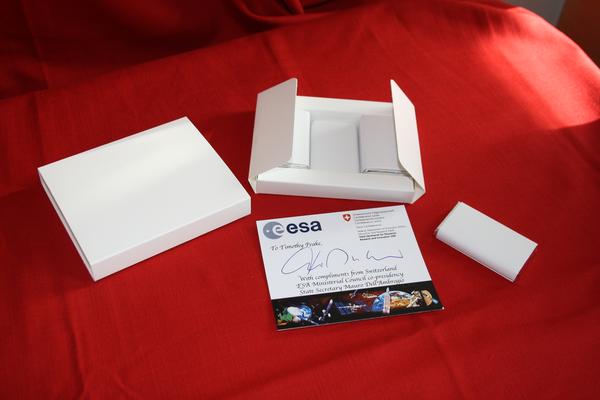Switzerland sends chocolate into space

British astronaut Tim Peake, holding chocolate and the card Switzerland has sent to the ISS. ©NASA/ESA
In addition to high precision and a desire to tidy things up, another Swiss value enters the space world: milk chocolate. A box containing six little bars of brand-name chocolate was recently given to each astronaut on the International Space Station (ISS). The boxes, which were prepared by the Swiss Space Center at EPFL, first had to make it through a long approval process.
What better way to meet the challenges of living in space than by applying traditional Swiss values? High-precision technology is used in numerous space instruments, EPFL’s CleanSpace One satellite project is aimed at one day cleaning up space debris, and Swiss chocolate has now been sent into space. Each of the six astronauts* currently serving on the International Space Station (ISS) has received a box with six brand-name chocolate bars. They were included in the latest resupply mission, which was carried by a SpaceX rocket launched on 8 April. The special delivery, sponsored by the State Secretariat for Education, Research and Innovation (SERI), was carefully prepared by the Swiss Space Center (SSC), at EPFL. As a thank you, the British astronaut Tim Peake sent a picture yesterday.
“This initiative was undertaken as part of Switzerland’s co-presidency of the European Space Agency Ministerial Council,” said Volker Gass, the director of the SSC. “The aim is to encourage and support the astronauts in their work in a symbolic way that reflects our country’s spirit and culture.”
But sending food into space is no cakewalk. As for any object or person preparing to leave Earth’s atmosphere, strict conditions must be met. In the end, it took six months for the chocolates, which were packaged last September, to finally get off the ground. While the launch was delayed several times since the start of the year, the chocolates also had to undergo the full gamut of checks and tests.
Recipe revealed
First, the proposal had to be approved by the European Space Agency (ESA). Once officials from Human Spaceflights and Exploration, in Germany, gave it their thumbs-up, a long list of practical details had to be addressed together with the chocolatier, HUG, a small company in the Canton of Lucerne.

A chocolate box and the card signed by Mauro Dell'ambrogio, State Secretary for Education, Research and Innovation, that were sent to each of the six ISS astronauts. (c)SSC.
The packaging first had to be redesigned to be as plain as possible. “Logos are not permitted on products going to the space station, which, for ethical reasons, cannot be used for advertising purposes,” said Martine Harmel, an assistant at the SSC, who handled all the logistical aspects. The weight of the boxes had to be minimized as well, which was done by removing all unnecessary paper and cardboard. And the manufacturer had to provide a full and detailed list of ingredients, thus revealing part of its trade secret.
No sharp corners
The boxes were then sent to the European Space Research and Technology Centre (ESTEC), in the Netherlands, whose work includes testing satellites and their sub-systems by simulating the conditions they will experience when launched and once in space.
“All objects going to the ISS have to undergo testing to ensure they are not flammable, do not produce fragments that could spread around the cabin, and cannot injure the astronauts,” said Bernd Rattenbacher, from the Center of Competence in Aerospace Biomedical Science & Technology at the Lucerne University of Applied Sciences and Arts.
ESTEC’s main task was to ensure that the boxes did not have any sharp corners or edges presenting a risk of injury. Once approved, the boxes were sent to the Aerospace Logistics Technology Engineering Company (ALTEC), another ESA center, in Italy. There, the contents of the package were verified and the customs documentation was completed. The package was finally sent to NASA, which delivered it to the ISS from the Cape Canaveral launch site in Florida.
The latest word was that it took 10 days after launch for the chocolates to reach the hands of the astronauts, who were busy unpacking three tons of food, equipment and scientific experiments included in the latest resupply mission. The European Astronaut Centre, a part of ESA’s Human Spaceflight and Exploration, in Germany, also received a call from the ISS astronauts, who expressed their thanks for this delicious surprise.
*Timothy Kopra (USA), Timothy Peake (UK), Yuri Malenchenko (Ukraine), Jeff Williams (USA), Alexey Ovchinin (Russia) and Oleg Skripochka (Russia).